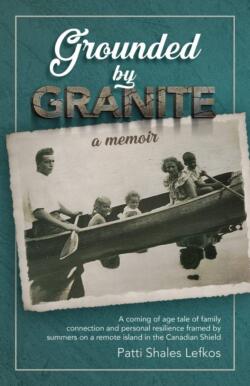Val's Book Reviews

Grounded by Granite: a memoir
by Patti Shales Lefkos
SilverStar Mountain: Loon Island Press, 2023
$27.62 / 9781999229825
Before I read Patti Shales Lefkos’ book Grounded by Granite, I decided to research the area known as the Canadian Shield in Ontario. That is where the author’s memoir takes place, and I admit I knew very little about that area of Canada.
I discovered that “The Canadian Shield, also called the Laurentian Plateau, is a geologic shield, a large area of exposed Precambrian igneous and high-grade metamorphic rocks.”

Patti Shales Lefkos is proud of the stories that grounded her and her extended family in this area where they spent numerous summers at Draper Lake on her own family’s island, Loon Island. She shares with her readers the cottage life there they enjoyed from the late 1940s to present day with stories that show the importance of family connecting in “a magical place that shaped me (her) as a woman physically strong and mentally determined enough to continue to trek with her mountaineering husband or travel the world solo,” later in life. She was indeed grounded by the granite of the Canadian Shield.
The book begins with maps of the area and a sideways family tree showing how her Shales ancestors first settled there in 1828.
At the end of her prologue, the author states:
My siblings and I are the only ones left of our generation. Now Doug (her brother) and I alone hold the memory of several childhood winters of fear and heartache, the terrifying realization of how close we came to losing this crucial hunk of adhesive that cements our widely dispersed clan, Loon Island.

The author begins her story in August 1948 with memories she recalls on her first camping adventure with her parents, and her two older siblings, Doug, and Donna, on Loon Island. As her story progresses with subsequent summers, it is interspersed with her comparable thoughts told in the future between 2011 and 2023. This style of writing can be confusing (rather like the sideways family tree at the beginning!) but once you understand where the author is going, it becomes an interesting way to write a memoir.
Post-war summers for Patti and her siblings were a joy. It was a simple life full of swimming lessons, fishing, canoeing, and hunting for snapping turtles. Even as the youngest sibling, she soon became proficient and skilled at the art of living life simply and with none of the comforts of modern-day living. It was an idyllic life— until a letter arrived at their home from the Department of Lands and Forests claiming that they might not in fact own the land.
Their paradise summer camping life was threatened, but the way they dealt with this is indeed a testament to a family’s strength and determination to preserve a way of life that was a strong connection to nature and to family.
I particularly enjoyed the author’s descriptions of life in the 1940s and 1950s when none of today’s safety measures for children or respect for the wilderness were observed. She describes how families often threw their cans and pop bottles in the lake assuming they sank to the bottom, and how her mother sprayed their tent and all three children with DDT every night to deter the hundreds of mosquitoes. Today she wonders how they ever survived! The comparison of her life today where she is passionate about helping children around the world survive, and preserving the ecosystem is extreme.
Back then, it was an innocent time of scary campfires, voices drifting across the surface of a moonlit lake, board games they played together or the comic books they read under the covers at night with minimum light offered by coal oil lamps. It is all described to perfection. Those lazy days of camping made the summers seem to last forever, and the author is extremely grateful that they offered her the chance to really get to know her family and later her extended family of grandparents, aunts, uncles, cousins, nieces, and nephews who owned separate islands in Draper Lake.
In one of the author’s future reflections in 2012, she states:
Some actors (her family), greying and wrinkled, now show their age. Some, lithe and energetic, enter the scene for the first time. So many of our activities and traditions have stood the test of time. New ones have been welcomed. The stage remains, the grass and granite theatre, still housing a platform for the next acts of family events.

This is a beautiful way to describe her adventurous, ready-for-anything family through the generations, as resilient today as they ever were. This is a memoir that will be relished and enjoyed by all who value the camping life and the outdoor experience of a simpler, perhaps more unique time. These folk were truly “off the grid” in every sense of the word, and throughout the book I could not help but feel a longing for that simple life of long ago to return.
Patti Shales Lefkos is a former teacher and strong advocate for inter-city children. She is the best-selling author of Nepal One Day at a Time. One Woman’s Quest to Teach, Trek and Build a School in the Remote Himalaya. She calls herself an adventure traveler who spends her winters at SilverStar Mountain Resort in British Columbia. In summer she still connects with her extended family in her Ontario cottage on her granite island. Profits from the sale of Patti’s books support education in rural Nepal.
Link to Original Review
“The Ormsby Review, named for pioneering historian and UBC professor Margaret Ormsby, is a remarkable and comprehensive online review of more British Columbia books than you ever imagined existing — the west coast publishing market is lively. It covers fiction, poetry, politics, memoir and much else, as well as a lot of local and west coast history.” – Christopher Moore, September 14, 2020.
Editor and Publisher: Richard Mackie
Mission Statement: The British Columbia Review, formerly The Ormsby Review, is a lively and inclusive Vancouver-based online journal devoted to the literature, arts, culture, and society of British Columbia. Our mandate is to review books by BC-based writers wherever they choose to publish them. We review books from the member publishers of the ABPBC (Association of Book Publishers of BC), but we also review books that are privately printed, self-published, or published by BC writers at publishing houses elsewhere in Canada or abroad. When possible, we also find BC reviewers. Our accessible and authoritative reviews and essays, written by experts in their fields, are packaged as illustrated magazine articles.
The British Columbia Review works with writers, publishers, and literary professionals across Canada to promote books published by BC writers or about British Columbia in all its diversity. We include books by all authors, regardless of race, age, ability, sexual orientation, gender or gender identity, ethnicity, religion, political belief, marital or family status, and/or status as Indigenous, Métis, or Inuit.
The editorial offices of The British Columbia Review are located near Commercial Drive in East Vancouver, in the traditional, unceded, and sometimes overlapping territories of the Musqueam, Squamish, and Tsleil-Wauuth peoples. Indigenous British Columbia, the land on which we live and create, extends over a large area comprising three culture areas, eight language families, and 32 distinct languages. We endeavour to review all books by and about Indigenous BC. Those reviews can be accessed directly here.
